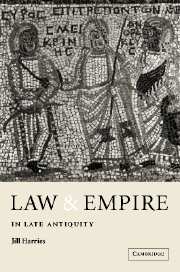Book contents
- Frontmatter
- Contents
- Preface
- Introduction
- 1 The law of Late Antiquity
- 2 Making the law
- 3 The construction of authority
- 4 The efficacy of law
- 5 In court
- 6 Crime and the problem of pain
- 7 Punishment
- 8 The corrupt judge
- 9 Dispute settlement I: out of court
- 10 Dispute settlement II: episcopalis audientia
- Conclusion
- Bibliography
- Index
- Frontmatter
- Contents
- Preface
- Introduction
- 1 The law of Late Antiquity
- 2 Making the law
- 3 The construction of authority
- 4 The efficacy of law
- 5 In court
- 6 Crime and the problem of pain
- 7 Punishment
- 8 The corrupt judge
- 9 Dispute settlement I: out of court
- 10 Dispute settlement II: episcopalis audientia
- Conclusion
- Bibliography
- Index
Summary
Although dirigiste in its language, imperial general law was in fact more often negotiated than imposed. No law was formulated in a political or juristic vacuum. Its content was determined by precedent, current policy, the state of the information available and pressures from interest groups with access to the consistory. Although laws were advertised as intended to endure ‘in perpetuity’, in practice they could be, and were, modified in the light of experience and further representations from those who operated the law or were affected by it.
To whom was any given law to apply? When, in November 426, the emperors Theodosius II and Valentinian III (then aged 5) addressed their oratio to the Roman Senate setting out some principles of government and law, they discussed what ‘general laws’ (leges generales) were, how they were brought into being and how they were to be recognised. Laws could be created either by the emperor's own initiative (‘spontaneus motus’) or in response to a plea or request (precatio), a report or referral (relatio), or a legal controversy arising from a lawsuit (lis mota) They were ‘general’ if addressed to the Senate as an oratio or labelled as an edict. As they were like edicts they would be publicised throughout the Empire through the offices of the governors, and they would be ‘general’ also if the emperors declared explicitly that the decision taken on a particular matter would also apply in analogous cases – or, of course, if they were called ‘leges generales’ and made applicable to all.
- Type
- Chapter
- Information
- Law and Empire in Late Antiquity , pp. 36 - 55Publisher: Cambridge University PressPrint publication year: 1999
- 1
- Cited by

